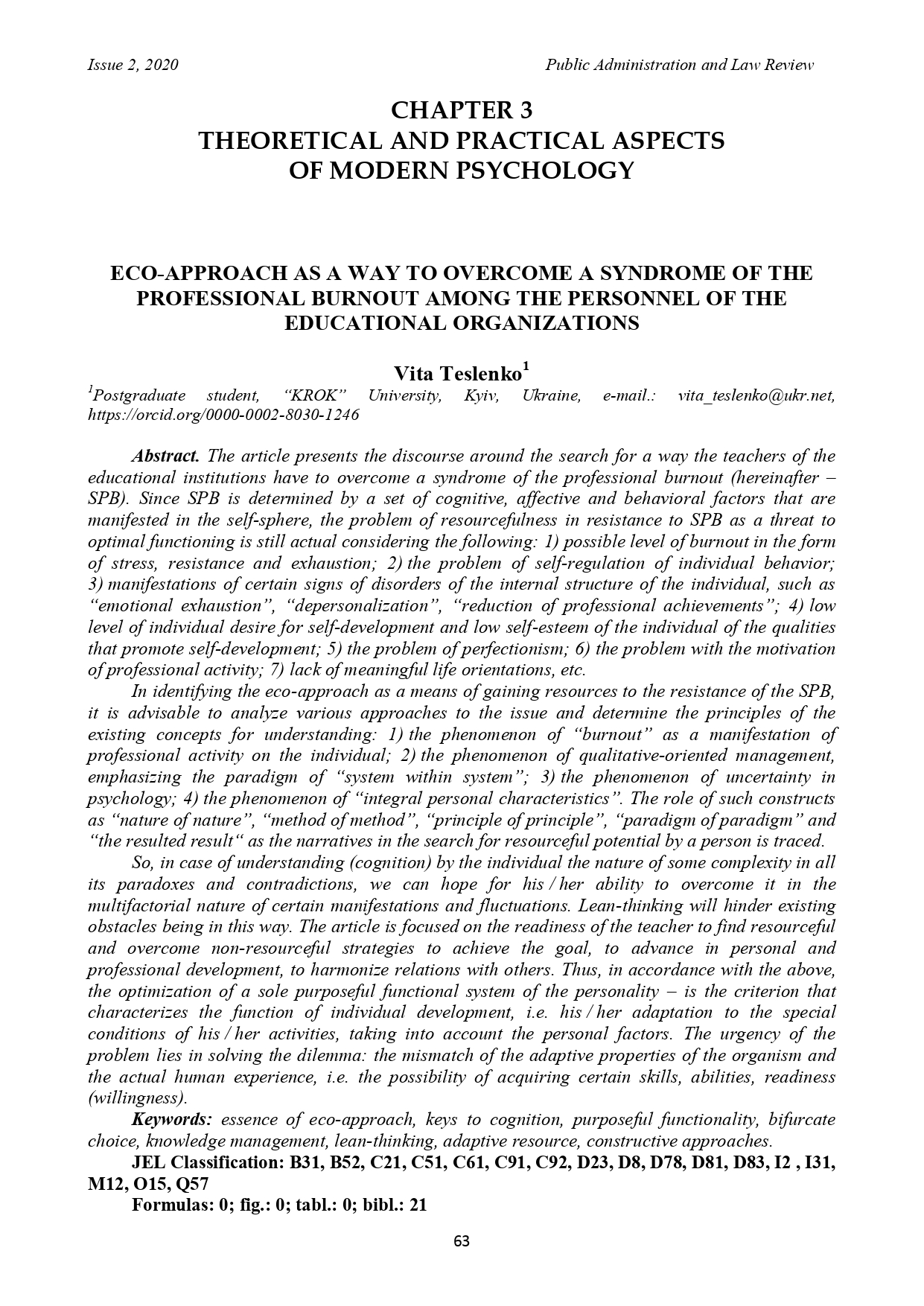ECO-APPROACH AS A WAY TO OVERCOME A SYNDROME OF THE PROFESSIONAL BURNOUT AMONG THE PERSONNEL OF THE EDUCATIONAL ORGANIZATIONS
DOI:
https://doi.org/10.36690/2674-5216-2020-2-63Keywords:
essence of eco-approach, keys to cognition, purposeful functionality, bifurcate choice, knowledge management, lean-thinking, adaptive resource, constructive approachesAbstract
The article presents the discourse around the search for a way the teachers of the educational institutions have to overcome a syndrome of the professional burnout (hereinafter – SPB). Since SPB is determined by a set of cognitive, affective and behavioral factors that are manifested in the self-sphere, the problem of resourcefulness in resistance to SPB as a threat to optimal functioning is still actual considering the following: 1) possible level of burnout in the form of stress, resistance and exhaustion; 2) the problem of self-regulation of individual behavior; 3) manifestations of certain signs of disorders of the internal structure of the individual, such as “emotional exhaustion”, “depersonalization”, “reduction of professional achievements”; 4) low level of individual desire for self-development and low self-esteem of the individual of the qualities that promote self-development; 5) the problem of perfectionism; 6) the problem with the motivation of professional activity; 7) lack of meaningful life orientations, etc.
In identifying the eco-approach as a means of gaining resources to the resistance of the SPB, it is advisable to analyze various approaches to the issue and determine the principles of the existing concepts for understanding: 1) the phenomenon of “burnout” as a manifestation of professional activity on the individual; 2) the phenomenon of qualitative-oriented management, emphasizing the paradigm of “system within system”; 3) the phenomenon of uncertainty in psychology; 4) the phenomenon of “integral personal characteristics”. The role of such constructs as “nature of nature”, “method of method”, “principle of principle”, “paradigm of paradigm” and “the resulted result“ as the narratives in the search for resourceful potential by a person is traced.
So, in case of understanding (cognition) by the individual the nature of some complexity in all its paradoxes and contradictions, we can hope for his / her ability to overcome it in the multifactorial nature of certain manifestations and fluctuations. Lean-thinking will hinder existing obstacles being in this way. The article is focused on the readiness of the teacher to find resourceful and overcome non-resourceful strategies to achieve the goal, to advance in personal and professional development, to harmonize relations with others. Thus, in accordance with the above, the optimization of a sole purposeful functional system of the personality – is the criterion that characterizes the function of individual development, i.e. his / her adaptation to the special conditions of his / her activities, taking into account the personal factors. The urgency of the problem lies in solving the dilemma: the mismatch of the adaptive properties of the organism and the actual human experience, i.e. the possibility of acquiring certain skills, abilities, readiness (willingness).
Downloads
References
Smıt, N. (2003), Sovremennye sıstemy psıhologıı, Praım EVROZNAK, SPb., Russia, Serııa «Psıhologıcheskaıa entsıklopedııa», 384 p.
Robson, S. (2013), Psychological fitness and resilience: A review of relevant constructs, measures, and links to well-being, RAND Corporation, Sean, Santa Monica, California, America, 32 p.
Poklykannia universytetu: Zb. nauk. pr. / Vidp. red. Homilko, O. (2005), RIA «IaNKO»; «VESELKA», Kyiv, Ukraine, 304 p.
Stasko, O. H. (2011), Vrakhuvannia umovnykh tsinnostei subiekta u roboti psykholoha, Marych, Kyiv, Ukraine, 92 p.
Vasylchenko, O. M. (2013), Reproduktyvna povedinka osobystosti. Sotsialno-psykholohichnyi analiz : monohrafiia, Vyd-vo «Noulidzh», Luhansk, Ukraine, 547 p.
Mıshın, V. G. (2009), Optımalnye ı ekstremalnye strategıı ýpravlenııa ekonomıcheskımı sıstemamı, Elektronnyı naýchnyı jýrnal «Ýpravlenıe ekonomıcheskımı sıstemamı», № 4 (20). № reg. statı 0080, available at: http://uecs.mcnip.ru.
Malkova, T. M. (2016), Psykholoho-pedahohichni problemy zmistu osvity, Pravnychyi visnyk Universytetu «KROK» / Vyshchyi navchalnyi zaklad «Universytet ekonomiky ta prava «KROK», Vyp. 25, Kyiv, Ukraine, pp. 166-173.
Sveiby, K. E. (2007), The Intangible Asset Monitor [Web-resurs], Journal of Human Resource Casting and Accounting, vol. 2, No. 1, available at: http://www.sveiby.com/.
Bolshakova, A. M. (2019), Psykholohichna nastolna T-hra yak tekhnolohiia korotkostrokovoho psykholohichnoho konsultuvannia, kouchinhu, treninhu (psykholohichna hra z elementamy treninhu «Smarahdove Misto»), Psykholohichni tekhnolohii efektyvnoho funktsionuvannia ta rozvytku osobystosti : monohrafiia / [za red. : S. D. Maksymenka, S. B. Kuzikovoi, V. L. Zlyvkova], Vyd-vo SumDPU imeni A. S. Makarenka, Sumy, Ukraine, pp. 366-384.
Moren, E. (2005), Metod. Prıroda Prırody, Progress-Tradıtsııa, Moscow, Russia, 464 p.
Kastoriadis, K. (2012), Dreyfuyuschee obschestvo. Besedyi i diskussii (1974-1997); [per. s fr. Borisa Skuratova], Gnozis / Logos, Moscow, Russia, pp. 240-242.
Adorno, T. V. (2003), Negatıvnaıa dıalektıka.1966, Naýchnyı mır, Moscow, Russia, 374 p.
Weinstein, Ya., Sumeracki, М., Caviglioli, О. (2018), Understanding How We Learn, Routledge, 1 edition, New York, America, 176 p.
Available at: https://naurok.com.ua/metapredmetne-navchannya-yak-innovaciyniy-proces-u-suchasniy-osviti-20575.html.
Lýkovıtskaıa, E. G. (1996.), Fenomen neopredelennostı v psıhologıı [Tekst], Tezısy naýchno-praktıcheskoı konferentsıı “Psıhologııa: ıtogı ı perspektıvy”, SPb., Russia, pp. 32-33.
Antonova, O. Ye. (2012), Kreatyvnist u strukturi pedahohichnoi obdarovanosti suchasnoho pedahoha, Andrahohichnyi visnyk, № 3, pp. 19-30.
Festınger, L. (2018), Teorııa kognıtıvnogo dıssonansa; [v per. s angl. A. Anıstratenko], Eksmo, Moscow, Russia, 256 p.
Belınskaıa, E. P. (2001), Konstrýırovanıe ıdentıfıkatsıonnyh strýktýr lıchnostı v sıtýatsıı neopredelennostı, Sotsıalno-ekonomıcheskaıa transformatsııa v Rossıı, № 130, pp. 30-53.
Blohıntsev, D. I. (2015.), Teorııa otnosıtelnostı A. Eınshteına, Izdatelstvo Lenand, Moscow, Russia, 106 p.
Heizenberh, V., Fedorchenko, A. M. (1993), Kvantova mekhanika, termodynamika i statystychna fizyka, Teoretychna fizyka, Vyshcha shkola, vol. 2, Kyiv, Ukraine, 415 p.
Apple, M. W. (2000), Between neoliberalism and neoconservatism; Education and conservatism in a global context, Globalization and Education: Critical Persrectives, Routledge, New York, America, pp. 57-77.

Downloads
Published
How to Cite
Issue
Section
License
Copyright (c) 2020 Scientific Center of Innovative Researches OÜ

This work is licensed under a Creative Commons Attribution 4.0 International License.





